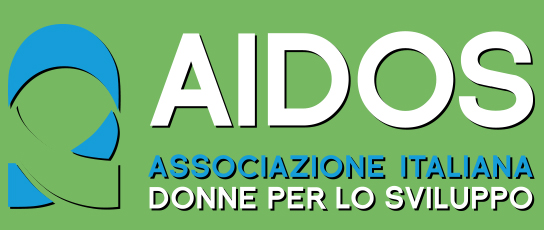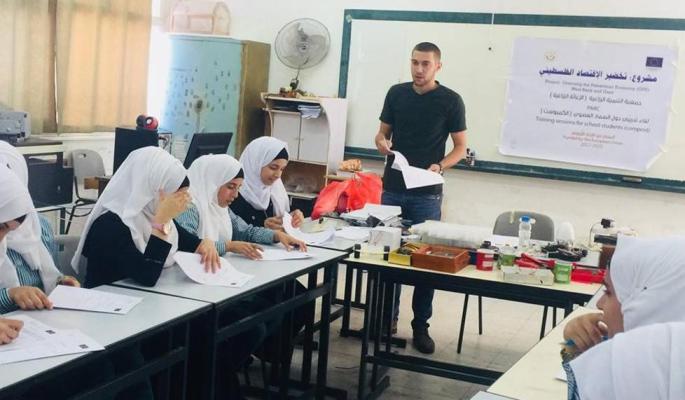2017 – 2020 Economic empowerment / Training
WHERE
Palestine – West Bank (WB) and Gaza Strip (GS) governatorates
PARTNERS
Agricultural Development Association (PARC) Lead Applicant; AIDOS Co-applicant
BACKGROUND
Despite progress in recent years, the composting industry in Palestine is in a difficult situation. Few industries in the sector are able to compete with products of high standards. The Palestinian economy has deteriorated over the past 15 years, with an average GDP growth rate of 4.5% from 2001 to 2013, with rising unemployment, especially among young people and rising cost of living. The agricultural sector, which is at the heart of the economic growth in Palestine, is in crisis mainly due to the consequences of the Israeli occupation and the continuous wars that have damaged farmers, increasing poverty, restrictions on movement and free trade. The initiatives that promote composting face many challenges and the market is flooded with more competitive Israeli products. The sector currently contributes only 3.9% of global GDP and employs only 8.10% of the Palestinian workforce, with a low percentage of young people and the consequent lack of use of new technologies. Women, who make up 32.9% of agricultural workers, have low wages, are involved in informal activities, are victims of a conservative culture, with the consequence that their work is not recognized when measuring national economic growth. Although knowledge on organic farming, “green energy”, reuse and recycling of solid waste is quite widespread, it is not able to bring real and sustainable change.
GOALS.
Overall goal: to contribute in leveraging the composting industry in Palestine as a driver for the Palestinian economy
Specific goal: to strengthen the capacities of 4 composting plants in target CBOs/company who have different levels of experience, production and selling powers, through forming a composting coalition with standardized, highly competitive products. This coalition is aimed to be transformed into a Palestinian composting company,
MAIN ACTIVITIES
More specifically, the project goals will be pursued through these activities:
Raise awareness about solid waste recycling and reuse, organic agriculture, and green energy through sensitization activities targeting farmer groups, women groups and school students on composting, organic agriculture, urban gardens, green points/women’s gardens; annual missions of Italian experts for the assessment, design, establishment and quality control of composting facilities; study visit to Italy for 11 Palestinian participants to model compost facilities/projects, urban gardens to exchange on their respective experience and to establish linkages with compost facilities, associations and cooperatives
Enhance the organizational and managerial capacities of 4 composting plants through: practical capacity-building activities including training in good governance, gender mainstreaming, strategic management, financial management; learning visits to Italy for composting plants’ staffs; development and implementation of strategic and business plans for each of the 4 composting plants
Increase the market share of the Palestinian compost through: 2 training sessions in 6 main modules (Good Governance, Inclusive business and green economy, SMEs management, Social enterprise and responsibilities, marketing and consumer behaviour and responsible consumption), 6 training courses on business management for cooperative; 2 market research and studies; 3 annual publications for experience dissemination (brochures, pamphlets, TV spot, based evident success stories). The activity will target mainly school students, women, farmers, nurseries, and decision makers; 2 “Buy Local Compost” promotion campaigns; marketing channels in rural areas through distribution points; pilot demonstrations in 8 sites for local composting; 6 semi-annual meetings for decision makers and key stakeholders for developing national standards for composting.
AIDOS ACTIVITIES
AIDOS will: coordinate the capacity building component regarding public gardens and green points; organize technical assistance missions in composting, urban gardens – women’s economic empowerment; organize visits to Italy and advocacy and information activities; produce a video. AIDOS will participate in all other activities of this proposed action under its responsibility as co-applicant
BENEFICIAIRES
Direct beneficiaries: 3 composting cooperatives and 1 community based organization specialized in composting and organic farming. The action is also aimed directly at students, women- headed households, farmers.
Indirect beneficiaries: local universities, the Palestinian Standards Institution – PSI and related ministries (Ministry of Agriculture, Ministry of Education, Environmental Quality Authority) nurseries and municipalities.
Final beneficiaries: a total of about 4,000 individuals: students (1,800), groups of women (900 women), groups of farmers (900 farmers), schools (30), families (60) and 156 members of the targeted cooperatives (including 15 women).
WHEN
1/03/2017 – 31/01/2020
COST OF THE PROJECT
1.827.000 €
WHO IS FINANCING
European Commission (1.497.567,00 €); PARC; AIDOS 5xmille

